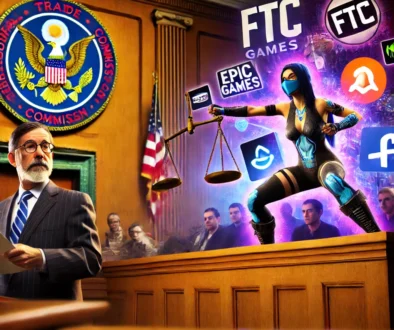Copyright, AI, and Fair Use on Trial: Thomson Reuters Enterprise Centre GmbH et al. v. ROSS Intelligence Inc.
This month, a jury will decide, for the first time, whether the use of copyright-protected material in the development of an artificial intelligence (AI) platform violates copyright law. The jury will also be asked to determine whether such infringement should qualify as a “fair use” – a perpetually controversial topic in the world of copyright.
In a federal court in Delaware, Thomson Reuters and its subsidiary West Publishing sued ROSS Intelligence back in May 2020 over ROSS’ alleged infringement of the Westlaw Key Number System and Westlaw’s Headnotes – two tools proprietary to West’s popular legal research tool, Westlaw, and intended to make research easier on the platform. More specifically, Thomson Reuters/West believes that ROSS hired LegalEase (a legal research and writing software platform) to scrape the Headnotes and West Key Numbers from hundreds of thousands of documents in the Westlaw database. Then, the allegation continues, ROSS took all of that data and used it to train its AI-powered “natural language” search tool for its own legal research tool. ROSS denies all of this, of course, and asserts the defense of fair use: even if they did infringe on West’s copyrights, this type of infringement should be excused because it is transformative in how it uses the data.
Infringement of legal-research database information might not be as thrilling or headline-grabbing as some of the disputes that have flared up throughout 2023 and 2024 in the music and film industries, but this case is significant because it is the first AI-based copyright infringement case that has reached the trial stage – and thus the first to be tried by a jury. And at the same time, it is the first case to test the theory that training of an AI’s learning model with copyrighted material should be considered a fair use. We can expect that the outcome of this case will influence some of the more recently filed lawsuits concerning the training inputs for music AI tools and ChatGPT.
Copyright law in the United States protects works of creative expression – and this does not just mean “artwork” or your favorite songs, movies, or performances. Any original work of authorship, including technical writing, instructional images, or commercial videos, can be protected by copyright law. If someone wants to use copyright-protected material, they must obtain permission (usually in the form of a license) from the copyright owner. But there are limits to what can be protected by copyright – for instance, judicial opinions and statutes are public domain, and cannot be owned exclusively by anyone. In this case, West claims that its Headnotes and Key Numbers constitute copyrightable material, giving it the ability to control access to the cases, statutes, and other legal documents in its database.
If someone uses a copyrighted work without permission, or in a way that exceeds the scope of a license from the copyright owner, that conduct is copyright infringement. This is what West claims happened here: LegalEase, which had a license from West to use the Westlaw database, allegedly exceeded the scope of that license by abusing its access to Westlaw and copying all of the data from it; ROSS, who did not have a license to use Westlaw at all, then used data it allegedly paid LegalEase for, to build its new AI-based legal research tool.
In some situations, an unlicensed use can be excused from copyright infringement liability if the infringing conduct qualifies as a “fair use.” Most fair uses take the form of commentary, criticism, news reporting, educational material, or parody of the original work. But there are no set rules – every fair use case must be determined on its own facts and merits. Courts apply those facts to a four-factor test found in section 107 of the Copyright Act, which looks at the way the infringing use incorporated or took from the original work, and what kind of commercial impact the infringement had on the original. As technology continues to challenge our copyright framework in new ways, the fair use doctrine has continued to evolve, and these days, the transformativeness of the infringing work seems to be the key element. Notably, in 2021, the Supreme Court of the United States found fair use where Google copied large portions of Oracle’s Java SE program in the process of developing the Android operating system. Much of the Court’s reasoning was based on a finding that Google (the infringer) transformed the purpose or character of Oracle’s copyrighted material by using it to create something completely different.
As one after another generative artificial intelligence tool has entered the market over the last two years, various groups of copyright owners have expressed serious concern over the impact that these tools will have on creators’ copyrights. Generative artificial intelligence, capable of creating original text, images, videos, and music, theoretically poses a direct threat to every single industry that depends upon some form of human creativity. The threat comes in large part from the fact that these AI tools affect “both sides” of the copyright coin: the creation of new works that may not need human creativity much longer, and the unlicensed use of pre-existing copyrighted material in the training of these AI tools. The first issue has sparked much fiery debate, but the second issue has generated the most litigation thus far. Industry groups in the literary/publishing industry have sued over the training of text-based tools such as ChatGPT, and in the music industry over the training of music creation tools such as Suno and Udio. The creators of these AI platforms have argued that they either (1) have secured licenses for the material that they use in the training of their learning models, (2) only use public domain or otherwise non-copyright-protected material for the models to train on, or (3) should not need to get a license because training the learning models is a fair use. In the Westlaw case, ROSS aligns itself with the last of these arguments, beseeching the jury to find that ROSS transformed the purpose and character of West’s Headnotes and Key Numbers by using them as training tools for a new AI legal research platform.
Many of the headline-grabbing lawsuits concerning ChatGPT and Suno won’t see trial for many years, if at all. But right now, in Delaware, a jury will determine whether ROSS infringed West’s copyrights in the Headnotes and Key Numbering system by using that content in the process of training its AI natural-language-search tool. The jury will also be asked to determine whether ROSS’s use of the Westlaw materials constitutes a fair use. A tall order, to be sure, but an important one. Copyright litigators and judges will be watching closely. Whatever the outcome, this case will surely impact the analysis in the Chat GPT and Suno cases.
Stay tuned to the Holon Law Partners blog as this case unfolds. The HolonAI team will be here to provide an update as soon as the jury returns their verdict.
Holon Law Partners has 100+ years of experience combined guiding clients through complex cases and legal intricacies. Our approach is empathetic, customized, and client-centered with a focus on you and your unique business needs. To schedule a consultation with us, call our team at (866) 372-0726 or email us at: info@holonlaw.com.




